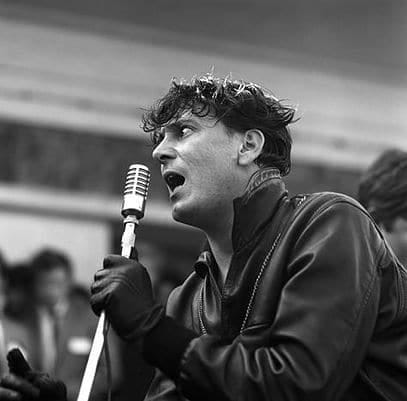Being on the run from the tax man has been (in some cases) responsible for some of the more critical roads taken to try to outrun the pitfalls of success. The exiled Rolling Stones learned this the hard way and ran from their homes & management in England for tax shelters on the French Riviera, ultimately producing a double LP that many argue may be their most important critical and artistic turning point during a period that would fold many a contemporary sixties artist moving into the complexity of the seventies.
Over a decade earlier, pioneering fifties Rockabilly crooner Gene Vincent would find himself on the Stones’ home turf looking for financial relief from the Stateside powers that be. Under mounting pressure from the musicians union to collect and on the outs with his backing band, The Blue Caps, Vincent would land in England with the help of English promoter Larry Parnes, sharing the top of a double bill with fellow rocker Eddie Cochran, who had befriended Vincent during the production of the first rock n’ roll film The Girl Can’t Help It, on a series of UK tour dates. The rising Cochran would tragically die on this tour in a car crash en route to the airport with his girlfriend, songwriter Sharon Sheeley, and Vincent. Sheeley’s hand was put in Cochran’s during the ambulance ride in one of the more touching stories of the era. Cochran succumbed to his brain injuries a day later. Blame was cast in Gene’s direction for the circumstances that strayed them all from the original plan and put them in that cab.
Vincent, whose signature Be-Bop-a-Lula, found real estate in my brain after seeing David Lynch’s Wild at Heart. That song lives atop the Mt. Kilimanjaro of dangerously erotic Rock n’ Roll love ballads. But, at the dawn of the sixties, American audiences were not as hungry to keep Vincent in the brand new Cadillacs he had been accustomed to just a few short years earlier. While tastes changed, fortunately, European kids were mainly excluded from the initial action—Cue Vincent’s black leather gloves and signature slanted stance as if clinging to the mic like his life depended on it (which resulted from a bad motorcycle wreck and his metal leg brace).
After sending a monthly check out to the IRS to keep my world level, I would find myself standing not in a mansion in the South of France passed out with a sunburned Anita or even across the desk of a slick promoter’s cramped office in Notting Hill plotting my next moves but in a small record store in Atwater Village down the road from the Griffith Park train ride thumbing through the stacks trying to get a beat on what the hell to do with myself. While Memphis Sun Records Rockabilly, both Cats bands, and The Cramps had spoken to me in my teenage punk years, I spent the last few decades concentrating interests elsewhere with the sole exception of an embittered and difficult Jerry Lee Lewis live recording from the second half of the sixties in which he stops the show to lecture a shouting drunk from his piano in a cocktail lounge about how Elvis stole Blue Suede Shoes from Carl Perkins—perhaps my favorite moment in music history or maybe all of history.
And as I kept thumbing, I came to what I thought was a Vince Taylor record, aka that leather-clad gold medallion-sporting Brit who had posed as an American after attending Hollywood High School only to go home to rock the house in the sixties before being forced into an early retirement through excessive hits of LSD while inspiring David Bowie’s Ziggy and a now legendary cover of his signature song on The Clash’s London Calling.
But ole Vince’s look must have been inspired by Vincent, which was clear as day when I pulled the posthumously released French comp 1972’s Gene Vincent 1960/62 vol. 4 and began examining the sleeve. Hmmm. While not quite a no-budget release, the gatefold itself was cryptic. It contained just a handful of photographs from the road and a track listing in very large print, none of which I recognized except for the revamped version of his signature hit with a 62 added on the end.
So yeah, I bought it, realizing that this moment of exile had been a conduit for the next generation and then the punks as well in the UK, remembering what Ian Dury once mused about his hero;
“So farewell mademoiselle, knicker-bocker hotel
Farewell to money owed
But when your leg still hurts and you need more shirts
You got to get back on the road”






Excellent!